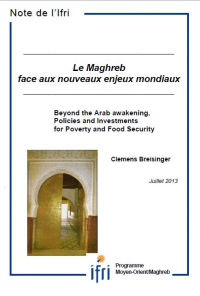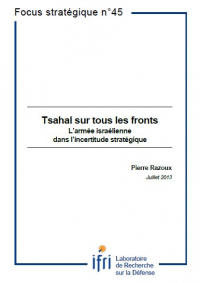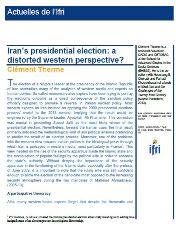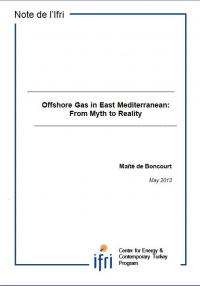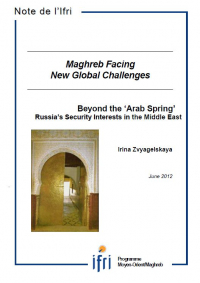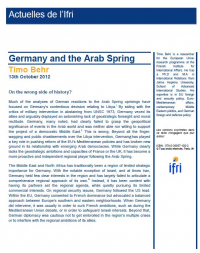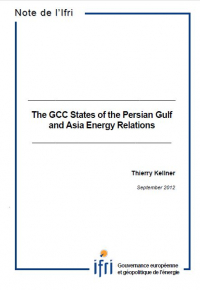This report aims to inform and stimulate the debate on key policy priorities for poverty reduction and food security in light of the Arab Awakening.

Middle East / North Africa
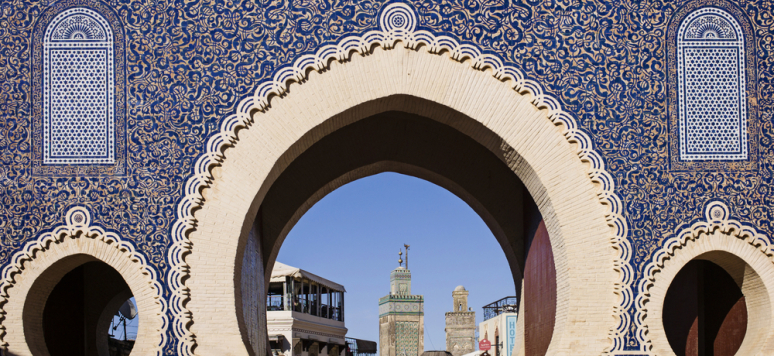
The Middle East and North Africa Programme at IFRI aims to provide expertise on the trends and developments in politics, societies and economies across the region.
The programme has the following objectives:
- Proposing a new approach towards the MENA region through an analysis of local, regional, and international dynamics with the potential to guide and influence new policies ;
- Highlighting the role of foreign powers which have traditionally been present in the region and analyzing the new role taken on by emerging countries ;
- Anticipating new directions and outlooks in each country;
- Interpreting risks and potentials and puting forward new templates for analysis.
The programme has built a dense network of researchers and experts who provide expertise on the MENA region and working together on a range of crosscutting themes.
Senior Research Fellow, Head of Ifri’s Türkiye and...
Research Fellow, Türkiye and Middle East Program
...Associate Research Fellow, Türkiye and Middle East...
Senior Advisor for North Africa and the Middle East
Research Interests:
- North Africa
- The Middle East
Associate Research Fellow, Türkiye and Middle East Program
...Associate research fellow, Turkey and Middle East Program
...Facing threats on all its borders, as well as social, economic and religious tensions, the Israeli Defense Forces (IDF) is now under significant pressure for ensuring its core mission: the survival of the State of Israel.
The election of a religious leader at the presidency of the Islamic Republic of Iran contradicts many of the analyses of western media and experts on Iranian politics.
The wave of deep offshore and unconventional gas and oil exploration projects, rendered economically feasible by relatively high prices and new technologies, has reached the shores of the Mediterranean. Levantine countries, including Cyprus, Israel, Palestinian Territories, Lebanon, Syria,...
In the long standoff regarding its nuclear ambition, Iran has cultivated ambiguity and been loath to reliably assure the international community of its ultimate intentions, complicating Western efforts to understand, let alone constrain, Tehran’s endeavors.
The 2011 insurgency in Libya brought about the demise of Supreme Leader Mouammar Qadhafi. A NATO-led coalition operated to meet a unique United Nations mandate including an arms embargo, no-fly zone, and the requirement to protect the population from armed attack.
The reconfiguration of the regional system of international relations as a result of the Arab revolutions has engendered fresh challenges for Russia, related, amongst other things, to deteriorating relations with the USA and other Western powers.
The Arab Gulf is the third largest receiving region for global migrants (after North America and the European Union). The six states of the Gulf Corporation Council (GCC) are the richest Arab economies, boast some of the highest GDP per capita rankings in the world, and they all depend upon...
Much of the analyses of German reactions to the Arab Spring uprisings have focused on Germany’s contentious decision relating to Libya. By siding with the critics of military intervention in abstaining from UNSC 1973, Germany vexed its allies and arguably displayed an astonishing lack of...
Since the 2000s, China and India's needs for hydrocarbons, coming on top of those of older industrialized Asian countries (Japan and South Korea), have considerably strengthened customer-supplier links between Asia in general and the Persian Gulf, in the energy field.
Aucun résultat









